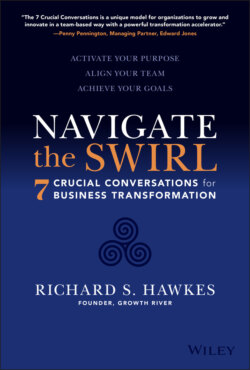Читать книгу Navigate the Swirl - Richard S. Hawkes - Страница 10
The Framework of Transformation
ОглавлениеEvery transformation must start somewhere—but it's not always easy to know where to start. We saw our initial challenge as identifying the future state we wanted for our firm, and the key competitive advantage that would endure through and beyond our transformation. As we began the work, we considered our purpose, culture, leadership, and capabilities, which helped us identify the gaps between where we were and where we aspired to be. We asked ourselves how we could future-proof our firm.
This exercise was, and is, a deeply human endeavor. We were considering the transformation of a beloved and impactful enterprise, one that tens of thousands of associates and millions of clients take very personally. Our mindset, our relationships, and the ways in which we collectively agreed to lead into the future, became fundamental to the work we were doing.
I believed strongly—and still do—that having a strong organizational purpose is the key to unlocking that organization's human potential. It provides a framework that everything else can be built upon. A worthy purpose unleashes the human spirit. It galvanizes people, and that's critically important, because the “how” of transforming from one thing to something else is hard. In fact, it flies right in the face of a deep human desire—to get good at something and stay good at it by relying on the things that helped you get good at it in the first place.
For a transformation to be successful, it needs to be purpose-driven, leader-led, and team-based. Those may sound like abstract or lofty words, but they become tangible and actionable when you put them to work in a large organization with a long history of working a certain way.
In our case, having some outside perspective proved to be very helpful—and confidence-boosting. We began working with Richard Hawkes and his team at Growth River to help us clarify the approach we wanted to align around in our multiyear journey. The Growth River Operating System, and in particular the Seven Crucial Conversations, are all built upon a specific way of thinking about teams and organizations, a unique model for understanding businesses, and a particular perspective on how organizations grow and innovate in a team-based way. Richard and his team helped us understand these foundational concepts, which helped set the stage for our journey.
It's also important to note that the Growth River team helped us develop a common vernacular that's proven very helpful in how we approach situations. I've likened it to the language of accounting—everyone knows what a debit or credit is, for example, and we agree on what we're talking about when we use those words. I can't stress enough how important it is to establish a common language around transformation—it makes it easier for us to have meaningful conversations and ensure that we consistently understand each other.
In our case, we've developed a dialect that's unique to Edward Jones. It's connected to our culture and rooted in terminology we've used for a long time. We have added a language associated with a common understanding of how a high-performing team works in concert.
With this language in place, we can have conversations that build more trust with one another and can deeply engage on topics that are critical to our transformation. The language and behaviors of a high-performing team are not intended to make things easy—they exist to make challenging work more productive while unleashing the spirit of the terrifically talented people you have on your team. Richard's team helped us recognize the importance and power of our language and helped us establish a baseline for it. From there, it has become uniquely ours.
